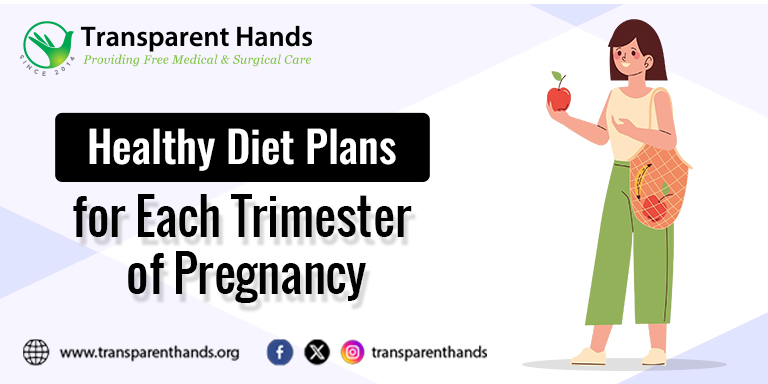Healthy Diet Plans for Each Trimester of Pregnancy

Do you know that a woman needs approximately 300 extra calories per day to maintain a healthy pregnancy?
Pregnancy is a great adventure, but at the same time, it can get really stressful. Probably the most challenging part of this beautiful time includes choosing the right diet. Health is different for everyone, and since there are many conflicting views on the same topic, a woman is mostly confused about what kind of nutrients her body will need during different stages of pregnancy. The secret is to supply the appropriate nutrients at the appropriate time.
No matter if it is the first trimester with its morning sickness or the last one when one gets ready for the arrival of the baby, a good diet should remain constant for the betterment of health for both.
In this article, we feature some simple and trimester-specific diet plans that will ensure not only the health of the baby and the mother but also keep the mother energetic enough to enjoy her pregnancy.
The Importance of Maintaining Nutrition During Pregnancy
Good nutrition will keep the baby developing well and at minimal risk for birth defects and complications during delivery. It goes without saying that during this sensitive stage, the calorie intake of a woman would rise and must come from a balanced combination of healthy food groups. It helps to satisfy the raised energy needs and facilitates healthy development of the fetus.
Nutrition can help in preventing the discomfort associated with some of the common symptoms of pregnancy such as nausea, fatigue, and constipation. Proper nutrition is also the main base for the future of a newborn as it may help to reduce the chances of obesity, diabetes, and heart disease in the later years of life. Hence, the importance of a nutrient-rich diet is not only for now but also for the future of the child in the coming years to ensure good health.
Healthy Diet Plan For Pregnancy: First Trimester
A healthy diet plan for the first trimester of pregnancy is important. The focus is on supporting the rapid cell division and growth of the embryo. Approximately 1800 to 2,000 calories per day are required in the first trimester, hence here’s a detailed guide on what to eat on a daily basis as recommended by USDA along with a trimester-specific nutritional requirements list.
Nutritional Requirements:
- Folic Acid: Prevents neural tube defects and supports early fetal development.
- Iron: Iron deficiency can account for more than 50% of anemia cases in pregnant women. It prevents anemia and supports the development of the baby’s brain.
- Calcium: It supports bone development and the formation of the baby’s skeletal system.
- Vitamin D: It aids in calcium absorption.
- Protein: It supports the growth of fetal tissues.
- Fiber: It helps with digestion and prevents constipation.
Daily Food Group Requirements
- Fruits: 2 cups daily
- Examples: Apples, citrus, bananas, berries, avocado, grapes, and watermelon.
- Benefits: They provide essential vitamins, fiber, and antioxidants.
- Vegetables: 2.5 cups daily
- Examples: Dark leafy greens, broccoli, bell peppers, cabbage, sweet potatoes, and beets.
- Benefits: They are rich in vitamins, minerals, fiber, and folic acid.
- Dairy: 3 cups daily
- Examples: Yogurt, cow or fortified plant milk, and natural cheese.
- Benefits: It supplies calcium and vitamin D.
- Protein: 5.5 ounces daily
- Examples: Lean meats, fish, eggs, beans, and lentils.
- Benefits: Provides protein, iron, and choline.
- Whole Grains: 6 ounces daily
- Examples: Whole grain bread, cereals, crackers, pasta.
- Benefits: It offers fiber, B vitamins, and iron.
- Foods to Avoid: Avoid raw or undercooked meat and eggs to reduce the risk of listeriosis and toxoplasmosis.
Healthy Diet Plan for Pregnancy: Second Trimester
A healthy diet plan for the second trimester of pregnancy requires an increased calorie intake of 2,200 to 2400 calories per day. Guided by USDA, we increase our daily intake of the food group requirements and add further nutritional requirements to support the rapid growth and development of the fetus.
Nutritional Requirements
Along with all the important nutritions mentioned in the list of the first trimester, we add Omega-3 Fatty Acids by the second trimester which is crucial for a baby’s brain and eye development.
Daily Food Group Requirements
With the calorie intake increasing, we keep our diet and food preferences constant but increase the quantity of our daily food group requirements.
- Fruits: 2 cups daily
- Vegetables: 3 cups daily
- Dairy: 3 cups daily
- Protein: 6.5 ounces daily, including food rich in Omega-3 such as fish and chia seeds.
- Whole Grains: 8 ounces daily
- Foods to Avoid: Even though seafood is a great source for Omega-3, steer clear of high-mercury fish like swordfish and king mackerel to prevent mercury exposure.
Best Superfoods for Weight Loss
Healthy Diet Plan for Pregnancy: Third Trimester
A healthy diet plan for the third trimester of pregnancy is highly important to support the last growth spurt of the baby and to prepare a mother’s body for labor and delivery. The third-trimester diet plan aims to prepare the body for labor and delivery and support the final stages of fetal growth. The calorie intake remains more or less the same as in the second trimester.
Nutritional Requirements
Continuing with the list of our previous two trimesters we should also increase the intake of choline in this last stage. It aids in the cognitive development of children and works to develop the baby’s spinal cord.
Daily Food Group Requirements
In the final stage of your pregnancy, your food preferences and intake should remain consistent with the second trimester. However, it’s important to focus on eating foods that support labor and the final development of your baby. Nutrient-rich options like choline are essential for brain development and overall growth. Maintain the following daily quantities for each food group:
- Fruits: 2 cups daily
- Vegetables: 3 cups daily
- Dairy: 3 cups daily
- Protein: 6.5 ounces daily, including food rich in Choline such as egg yolks, soy products, broccoli, etc.
- Whole Grains: 8 ounces daily
- Foods to Avoid: Avoid processed foods and carbonated beverages to maintain a healthy diet.
Why Is Protein Important for Weight Loss?
Conclusion
No size fits all, but ensuring proper nutrition and a healthy diet during pregnancy is crucial for both maternal health and optimal fetal development.
Since Pakistan has a relatively high maternal mortality rate, Transparent Hands is taking multiple steps to help deserving women, including free C-Sections, distribution of folic acid and other supplements at medical camps, ultrasound scans, and gynecological check-ups by female doctors. .
Join us in protecting motherhood across Pakistan. Contribute today.











Leave Your Comments